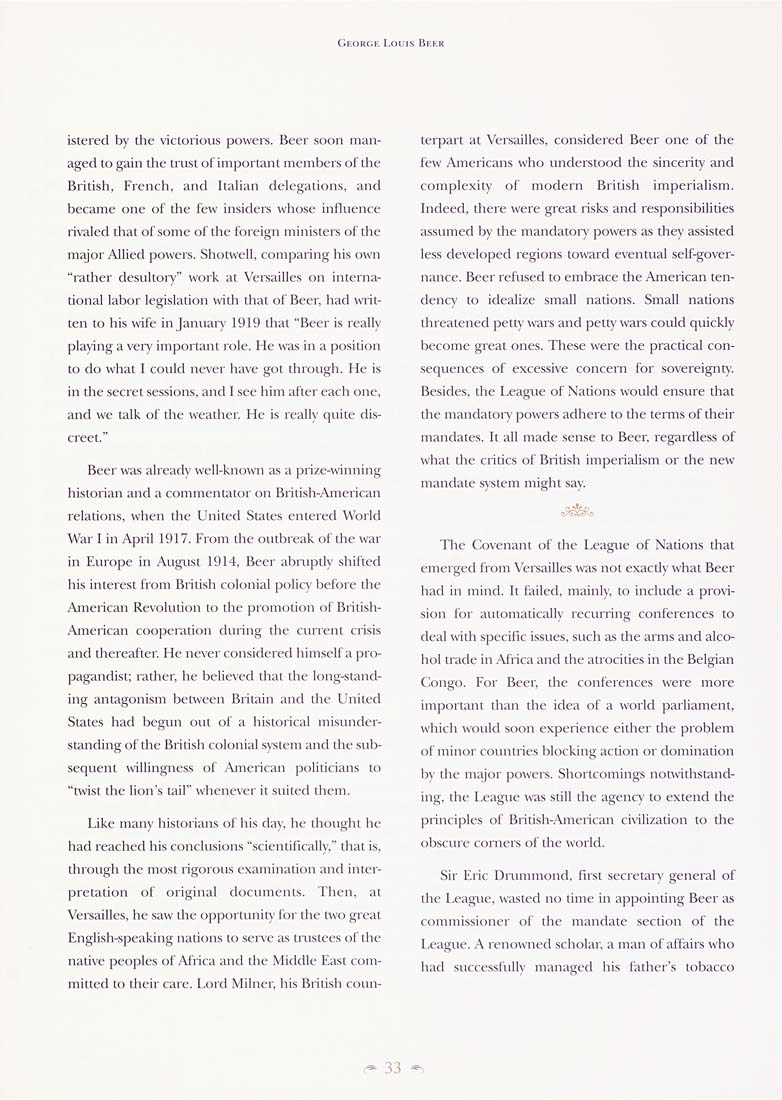Columbia Library columns (v.44(1995))
(New York : Friends of the Columbia Libraries. )
|
||
|
|
|
|
| v.44,no.2(1995:Autumn): Page 33 |

Gkokge Louis Beer istered by the victorious powers. Beer soon man¬ aged to gain the trust of important members of the British, French, and Italian delegations, and became one of the few insiders whose influence rivaled that of some of the foreign ministers of the major Allied powers. Shotwell, comparing his own "rather desultory" work at Versailles on interna¬ tional labor legislation with that of Beer, had writ¬ ten to his wife injanuary 1919 that "Beer is really playing a very important role. He was in a position to do what I could never have got through. He is in the secret sessions, and I see him after each one, and we talk of the weather. He is really quite dis¬ creet." Beer was already well-known as a prize-winning historian and a commentator on British-American relations, when the United States entered World War I in April 1917. From the outbreak of the war in Europe in August 1914, Beer abruptiy shifted his interest from British colonial policy before the American Revolution to the promotion of British- American cooperation during the current crisis and thereafter He never considered himself a pro¬ pagandist; rather, he believed that the long-stand¬ ing antagonism between Britain and the United States had begun out of a historical misunder¬ standing of the British colonial system and the sub¬ sequent willingness of American politicians to "twist the lion's tail" whenever it suited them. Like many historians of his day, he thought he had reached his conclusions "scientifically," that is, through the most rigorous examination and inter¬ pretation of original documents. Then, at Versailles, he saw the opportunity for the two great English-speaking nations to serve as trustees of the native peoples of Africa and the Middle East com¬ mitted to their care. Lord Milner, his British C(mii- lerpart at Versailles, considered Beer one of the few Americans who understood the sincerity and complexity of modern British imperialism. Indeed, there were great risks and responsibilities assumed by the mandatory powers as they assisted less developed regions toward eventual self-gover¬ nance. Beer refused to embrace the American ten¬ dency to idealize small nations. Small nations threatened petty wars and petty wars could quickly become great ones. These were the practical con¬ sequences of excessive concern for sovereignty. Besides, the League of Nations would ensure that the mandator)' powers adhere to the terms of their mandates. It all made sense to Beer, regardless of what the critics of British imperialism or the new mandate system might say. The Covenant of the League of Nations that emerged from Versailles was not exactiy what Beer had in mind. It failed, mainly, to include a provi¬ sion for automatically recurring conferences to deal with specific issues, such as the arms and alco¬ hol trade in Africa and the atrocities in the Belgian Congo. For Beer, the conferences were more important than the idea of a world parliament, which would soon experience either the problem of minor countries blocking action or domination bv the major powers. Shortcomings notwithstand¬ ing, the League was still the agency to extend the principles of British-American civilization to the obscure corners of die world. Sir Eric Druniniond, first secretary general of the League, wasted no time in appointing Beer as commissioner of the mandate section of the League. A renowned scholar, a man of affairs who had successfully managed his father's tobacco 33 |
| v.44,no.2(1995:Autumn): Page 33 |







